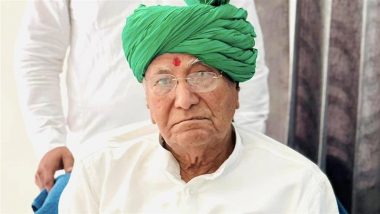
Born on January 1, 1935, in Chautala village, Punjab (now in Haryana), Chautala was the son of Chaudhary Devi Lal, a prominent political leader who served as Deputy Prime Minister of India. Chautala's political journey was deeply influenced by his father's legacy, leading him to play a pivotal role in Haryana's state politics.
Chautala's tenure as Chief Minister spanned four distinct periods: December 1989 to May 1990, July 1990, March to April 1991, and July 1999 to March 2005. His leadership was marked by efforts to enhance the state's agricultural sector and rural infrastructure, reflecting his commitment to the agrarian community.
Throughout his career, Chautala was a central figure in the Indian National Lok Dal (INLD), a party founded by his father in 1996. Under his stewardship, the INLD became a significant force in Haryana politics, advocating for farmers' rights and state development.
However, Chautala's political journey was not without controversy. In May 2022, he was convicted in a disproportionate assets case and sentenced to four years in prison, becoming the oldest inmate in Delhi's Tihar Jail at the age of 87. This conviction followed a previous imprisonment related to a teacher recruitment scam, for which he was released in 2020.
Chautala's personal life was marked by his marriage to Sneh Lata Chautala, who passed away in 2019. He is survived by his two sons, Ajay Singh Chautala and Abhay Singh Chautala, both active in state politics, and three daughters. His grandson, Dushyant Chautala, serves as the Deputy Chief Minister of Haryana, indicating the family's continued political influence.
The news of Chautala's passing has elicited condolences from across the political spectrum. Leaders have acknowledged his contributions to Haryana's development and his role in shaping the state's political narrative. His death marks the end of an era, leaving a significant impact on the region's political history.
Chautala's political career began in the 1970s, following in his father's footsteps. He was first elected to the Haryana Legislative Assembly in 1970 as a member of the Janata Dal. His early years in politics were marked by both achievements and controversies, including a notable incident in 1978 when he was detained at Delhi airport for allegedly bringing a large number of wristwatches into the country, leading to a temporary fallout with his father.
Despite these challenges, Chautala rebuilt his political career, leading campaigns such as the "Nyaya Yudh" to support his father's electoral bid in 1987 and organizing protests against corruption in the 1990s. He was elected to the Rajya Sabha in 1987 and served until 1990. In December 1989, he became Haryana's Chief Minister, succeeding his father, who had been appointed Deputy Prime Minister of India. However, he was unable to secure a seat in the state assembly within the required six months and had to step down in May 1990. He later won a by-election and briefly served as Chief Minister again in 1990-91.
After the Congress Party's victory in the 1991 Haryana elections, Chautala entered the assembly through a by-election in 1993. In 1995, he resigned in protest against a water-sharing agreement with neighboring states. He won a seat in the 1996 elections and became the Leader of the Opposition. The Indian National Lok Dal (INLD) was formed in 1998, and in 1999, after the Haryana Vikas Party lost its majority, Chautala became Chief Minister for a fourth time.
Chautala's leadership was characterized by his focus on agricultural development and rural infrastructure. He implemented policies aimed at improving the livelihoods of farmers and enhancing the state's agrarian economy. His tenure also saw efforts to develop rural infrastructure, including roads, irrigation systems, and educational institutions, contributing to the overall development of Haryana.
However, his career was also marred by legal challenges. In addition to the disproportionate assets case, Chautala was convicted in a teacher recruitment scam, leading to his imprisonment. These legal issues cast a shadow over his political legacy, raising questions about corruption and governance during his tenure.
